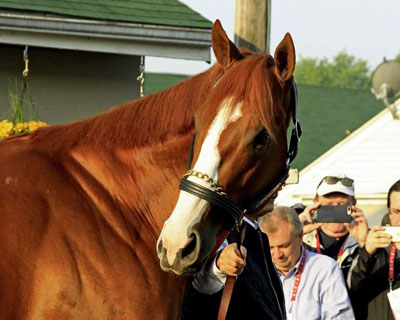
Justify, winner of the Kentucky Derby on May 5 in Louisville, Kentucky, looks at his admirers. He ran a great race on the sloppiest track ever at Churchill Downs. Way to Go Justify!
I believe a horse is one of the most beautiful animals in the world. There is nothing more graceful than watching horses run and cavort in a pasture. Colts and foals are so frisky, even on their wobbly legs when newborn. So my eyes were glued to the television last Saturday afternoon for my most favorite sport, horseracing.
Actually, it is the only sporting event I will watch from start to finish. But last week’s race was simply splendid. The slushiest track on record at Churchill Downs was literally a quagmire. But Justify pulled out at the start and never looked back. Nor did jockey Mike Smith. Will Smith and Justify perform as well in Baltimore at the Preakness Stakes and then at Belmont Stakes east of New York City? If so, it will be an incredible Triple Crown win since Justify did not race as a two-year old. We could be in for a great race season this year.
At one time Greenville, Texas, was a horseracing center. Following the Civil War, men and their horses met in the center of Black Cat Thicket at a salt lick known as Devil’s Racetrack. The whole story is somewhat hush-hush but I gather quite a bit of money changed hands. By the turn of the century, young socialites invaded Devil’s Racetrack. Choctaw Indians brought their best horses down from the reservation. It was quite the place, but few admitted enjoying the sport for some reason; probably because it was not considered good taste. Wives most likely disapproved.
In the late 1890s Greenville leaders decided the town needed a fair. Land on the Moulton Estate was purchased for the North Texas Fair. Today the former fairgrounds are located on the site of the late YMCA and Shirey’s clothing factory on Stanford Street. North Texas Fair was organized as a moneymaker for local merchants, a wholesome activity for families, and a legitimate racetrack for gamblers; not necessarily congruent reasons.
Horses arrived from all over the South and from the Indian Nations across the Red River. Huge crowds gathered at the racetrack, big city newspapers like the Dallas Times Herald and the Fort Worth Star Telegram sent reporters to watch some great horses run.
So what happened to those horse races that drew such large crowds? In 1909 the Texas Legislature voted to prohibit racetrack gambling altogether. Greenville and the rest of Texas was in the throes of Progressive Politicians who wanted to clean up saloons, racetracks, and other unacceptable pleasures. Their slogan was to close racetracks for protection of “little children whose parents wasted family funds on gambling.” Ironically this was the same excuse used since Colonial Times to curtail manufacturing, sales and use of alcoholic beverages.
This is also Mother’s Day. I want to wish everyone a glorious day with your children, if possible. Recall special memories, chuckle at old photographs, enjoy food from the past, and love each other. Cheers!

Pingback: Carol Taylor: ‘Justify’ Revives History Of Greenville Horse Racing | The GG